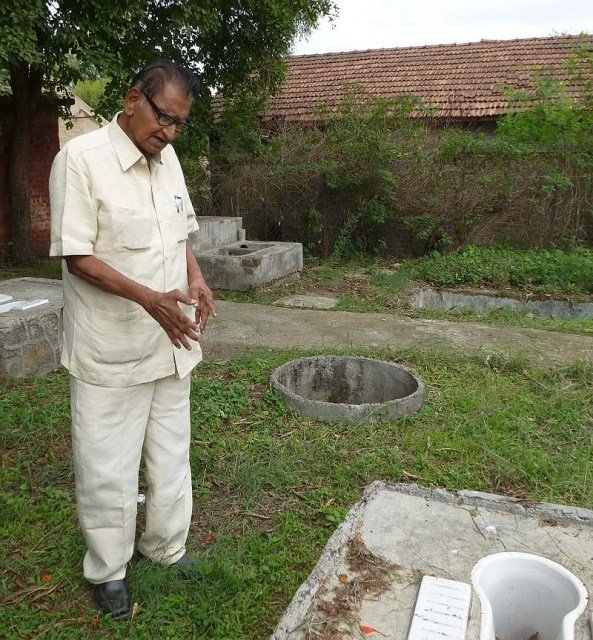
Dr Mapuskar, Who Dedicated His Life To Provide Clean Toilets To Villagers, Conferred With Padma Shri
27 Jan 2017 8:54 AM GMT
Dr Mapuskar from Dehu village, Pune, Maharashtra, popularly known as ‘Swachhta Doot’ has been honoured with the Padma Shri posthumously. He had dedicated his life to make the village open defecation free.
He was amongst the rare doctors who believed in not just curing a disease, but also preventing it. In a country where close to fifty percent people still defecate in the open, and over thousand children below the age of five succumb to preventable diseases like diarrhoea every day. Dr Mapuskar decided that he would keep building toilets.
The sanitation pioneer
Dr Mapuskar is a true sanitation pioneer. He worked actively on native technology and community-based solutions to lead the country towards a clean revolution. After college, Dr Mapuskar approached the Directorate of Health Services for a job. There was only one vacancy in Dehu village. He readily took the job and moved there. Once, when the villagers told him that the hospital was haunted, the young doctor slept in the hospital verandah. He slept well, but the next morning he discovered that there were no toilets in the hospital.
To relieve himself, he went through the village into the forest. He found a lot of villagers there who he had met the previous evening. He felt ashamed and made a decision to never defecate in the open. He excavated a simple trench toilet for himself and used medicine cartons to form a wall around the bathroom. His next goal was to start a revolution.
Initial days
Dr Mapuskar realised in the course of his medical practice that he was never called to treat more than a handful of illnesses which were all hygiene related. He decided to tackle the cause of the infection. He made an effort in the sanitation area and constructed ten toilets by following a World Health Organisation publication “Excreta Disposal in Rural Areas.” The designs of the toilets were not suitable for India. The toilets would collapse during the monsoon. This led him to adopt the local technology. He discussed with his staff and other communities about the importance of hygiene and sanitation.
Worm Infestation Survey in 1963
Dr Mapuskar initiated a worm infestation survey by obtaining funds from the Gram Sabha. He covered 100% of the residents and learned that 86 percent of the people were suffering from an infection. He set up two microscopes to explain the origin of the infection. One lens had a sample of infected faeces and the other with a soil sample. Both the samples had worm eggs. This helped convince the residents that defecating in the open was the origin of infection. The villagers were dewormed by obtaining medicines from the government. The medicine required for curing the villagers cost Rs 10,000, and the cost of constructing a toilet was Rs 400.
Under the guidance of Dr Mapuskar, the villagers conducted various awareness campaigns, group discussions and household visits. A meeting was also organised, and it was decided to construct Annasaheb Patwardhan’s ‘sopa sandas’ toilets.
A committee was appointed to implement toilet construction, and a secretary was made accountable for the funds. Every household contributed Rs 400 to the secretary, and the remaining money was given back to the families. 100 toilets were built in a month.
90% of the village had toilet coverage by 1980, and by 2004 there were 800 two pit washrooms. 100 were based on biogas plants, and 100 were based on nightsoil converted to biogas plants. The entire village had built their washrooms.
Pay and Use Models
Dr Mapuskar began promoting biogas toilets in 1980. These were developed by Appasaheb Patwardhan, and the first person to adopt this was Mrs Pardeshi. She built two toilets, one for her family and another for the neighbours. She would charge Rs 5 per month and soon the pay and use washrooms, and the sale of compost and generation of gas earned her Rs 700 every month. Today, there are 75 such pay and use model biogas toilets functioning in the village. Dr Mapuskar modified the design and developed the Malaprabha biogas toilets.
Decentralised on-site integrated waste management
Later, DOSIWAM (Decentralised on-site integrated waste management) was developed from community biogas plants. It is implemented in 25 sites across the nation. Simultaneously, he founded two organisations, the Appasaheb Tantraniketan and Jyotsana Aarogya Prabodhan to work on appropriate technology and health awareness.
After 18 years of selfless service, Dr Mapuskar opted for voluntary retirement and continued to stay in Dehu and work with the residents there.
Dr Mapuksar was conferred with Nirmal Gram Puruskar Award from Former President Late APJ Abdul Kalam in 2006.
The Logical Indian salutes Dr Mapuskar for his selfless devotion towards making the village open defecation free.
 All section
All section















